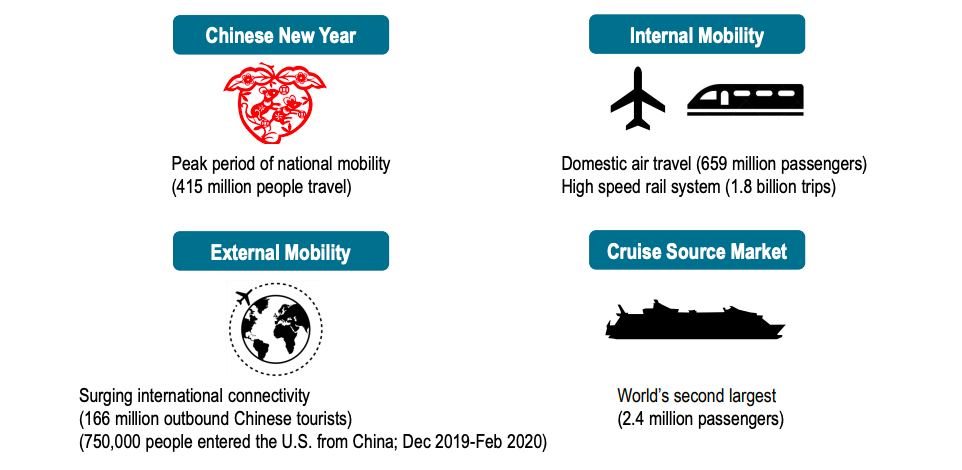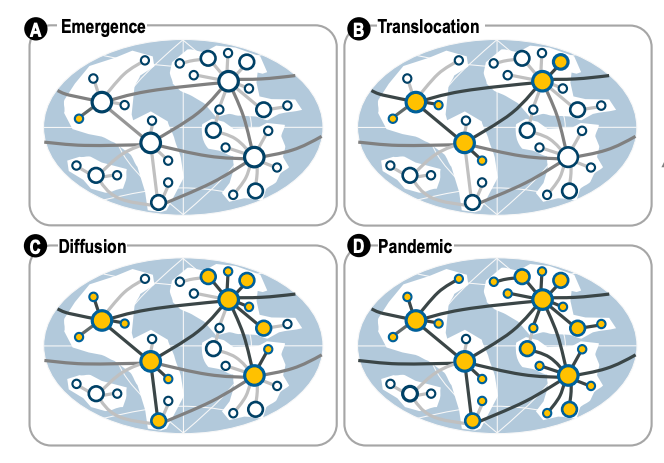News | Rodrigue Addresses COVID-19 Impacts on Global Trade
Stop the VideoNews

When METRANS Director Genevieve Giuliano was organizing the agenda for the METRANS Advisory Board meeting to be held virtually in early April, she wanted to focus on the coronavirus pandemic and its impact on global goods movement. She immediately thought of Dr. Jean-Paul Rodrigue.
"Professor Rodrigue is one of the world’s experts in international trade. He has researched just about every aspect of trade, including the potential impact of a pandemic some 15 years ago. I knew he would be the right person to tell us what we can expect from the coronavirus," explained Giuliano.
Rodrigue joined the Zoom meeting that day to present "Coronavirus Impacts on Trade and Supply Chains." A key concept of the presentation focused on the links between the emergence of the pandemic and the connectivity of locations, particularly what Dr. Rodrigue characterized as "the curse of connectivity." Using the spread of COVID-19 in the Chinese city of Wuhan, he stated that the emergence of the disease within a hub of trade and transportation connectivity allowed the disease to "immediately move internationally based on the connectivity of China and Wuhan itself."

The four different components of China’s “curse of connectivity,” that led to the spread of COVID-19.
Critical factors such as China’s increase in internal mobility, which Rodrigue noted “has skyrocketed in terms of air travel [and] the highspeed rail system,” external mobility, China's position as the second largest cruise ship market, as well as the rush of travel during Chinese New Year worked as components of connectivity that allowed COVID-19 to spread. As Rodrigue explained, “all of this put together has obviously created a recipe for the hyper diffusion of something that I would say is quite communicative.”
Rodrigue also remarked that aspects of transportation, such as the rapidness of modern transportation and the increased contact during the last mile of deliveries, also work against slowing the effects of COVID-19, or “flattening the curve,” making quarantines less effective.
Rodrigue indicates global travel as the most important factor in the global spread of disease.
After explaining the rapid dispersion of COVID-19, Rodrigue focused on the pandemic’s effect on supply chains asserting that there are three different “shocks” that have and are expected to impact the economy. Towards the beginning of the pandemic in early March of this year, a supply shock was detected as factories in China were forced to pause production because of COVID-19. Chinese factories are a large component of exports, and the interruption to their manufacturing led to shortages in several sectors like pharmaceuticals and medical equipment, as well as daily household goods.
“Try to buy yourself some headphones these days,” Rodrigue joked during the presentation, “you won’t be able to.” Such shortages in supplies were followed by a demand shock during the middle of March that affected demand on a global scale. Demand both shifted and dropped as a result of a lockdown of a large global consumer base, collapse of the tourism market, hoarding, and a switch to basic goods.
While China has begun to recover from the first shock and the second shock to global demand continues, Rodrigue anticipates a dual propagation shock where demand will be deferred, hence Rodrigue nicknaming it “the deferred demand trap.” The dual propagation shock to the economy is expected to cause a decline in economic activity and income as people temporarily lose their occupations and could lead to temporary job losses becoming permanent as employers and stores now declare bankruptcy according to Rodrigue.
As the pandemic continues, Rodrigue predicts strong deflationary trends that will affect the “great majority of assets, from real state, commercial, residential, raw materials, consumer goods,” the disruption and resiliency of supply chains being tested, low commodity prices inciting protectionism that will compel countries to “close their borders in many different ways,” and permanent overall change to the global economic field.

The four phases a disease takes to become a pandemic. According to Dr. Rodrigue, China’s connectivity allowed COVID-19 to jump from the emergence stage to translocation.
During his presentation, Rodrigue also highlighted the different setbacks facing global supply chains across industry sectors during the COVID-19 pandemic and the possible long-term changes to how those supply chains operate.
To watch the presentation, click here.
To view the presentation slides, click here.
Jean-Paul Rodrigue received a Ph.D. in Transport Geography from the Université de Montréal (1994) and has been a professor at Hofstra University since 1999. Dr. Rodrigue’s research interests cover the fields of transportation and economics as they relate to logistics and global freight distribution.
News Archive
- December (1)
- November (6)
- October (4)
- September (2)
- August (3)
- July (4)
- June (3)
- May (7)
- April (8)
- March (11)
- February (8)
- January (7)
- December (7)
- November (8)
- October (11)
- September (11)
- August (4)
- July (10)
- June (9)
- May (2)
- April (12)
- March (8)
- February (7)
- January (11)
- December (11)
- November (5)
- October (16)
- September (7)
- August (5)
- July (13)
- June (5)
- May (5)
- April (7)
- March (5)
- February (3)
- January (4)
- December (4)
- November (5)
- October (5)
- September (4)
- August (4)
- July (6)
- June (8)
- May (4)
- April (6)
- March (6)
- February (7)
- January (7)
- December (8)
- November (8)
- October (8)
- September (15)
- August (5)
- July (6)
- June (7)
- May (5)
- April (8)
- March (7)
- February (10)
- January (12)















